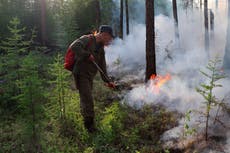Ikea sold children’s furniture ‘made of illegally-logged Russian wood’
Firms controlled by multimillionaire accused of axing 4 million trees vital to absorbing greenhouse gases

Ikea has for years sold children’s furniture made from wood linked to vast illegal logging in protected Russian forests, environmental activists claim.
The retail giant is accused of sourcing pine from a group of companies that over the past decade axed 4 million trees in Siberia, said to be vital in limiting climate change by absorbing greenhouse gases.
Ikea said the suppliers involved complied with the law and it does not accept illegally logged wood, but nevertheless it dropped the companies earlier this year as a precaution.
The popular Sundvik children’s range, which includes tables, beds and wardrobes, and the Flisat dolls’ house are among items likely to be tainted with the Russian wood, according to a report by Earthsight, a UK environmental investigation organisation.
The forestry firms in Irkutsk province that supplied the wood were run by a Russian multimillionaire, the report claims, and were linked to “sanitary logging” – felling trees under the pretext that they are dead, dying or diseased.
The investigators estimated that shoppers have been buying an Ikea product containing the wood somewhere in the world every two minutes.
Russia has 19 per cent of world forest reserves by surface area, and Siberia’s forests store as much damaging carbon as the Brazilian Amazon, Earthsight says.
Yet the group believes that the logging firms supplying Ikea and other retailers are contributing to huge biodiversity loss, fuelling the climate crisis and leaving the region increasingly prone to devastating wildfires.
The Forest Stewardship Council (FSC), the global green scheme for wood, certified the timber as legal and sustainable, before it was shipped to an Indonesian manufacturer that supplies Ikea stores around the world, including in the UK, US, Germany and France.
The investigators say they spent a year visiting logging sites, going to meetings undercover and analysing satellite imagery and official documents, court records and customs data.
Protected forest zones were logged, and miles of shorelines crucial for fish spawning and erosion and flood control were stripped of trees, Earthsight says.
The work left “a dangerous, ravaged tinderbox prone to fire in their wake” the investigators warn.
It’s estimated the companies sourced 2.16 million cubic metres of wood over 10 years. Piled high, the logs would rival the Great Pyramid of Giza.
Retailers rely on FSC auditors to ensure their wood is legally sourced, but Earthsight claims their trust in the scheme is “wildly misplaced”.
Earthsight director Sam Lawson said: “These are systemic problems, requiring systemic solutions, which go beyond one buyer, one supplier or one country. Governments in Europe and the US need to act urgently to stem the flow of stolen wood once and for all.”
An Ikea spokesperson said: “Under no circumstances do we accept illegally logged wood in our supply chain. We take reports and findings from NGOs and other stakeholders very seriously and where we discover irregularities, we take immediate action.”
The company confirmed that some suppliers had bought wood from the companies identified in the report, but added: “Based on the fact that the harvests were formally authorised by the Russian forestry authorities, Ikea suppliers purchased the wood following correct legal procedures.”
Ikea said it had dropped the companies as a precautionary measure in March. “In accordance with our regular ways of working, we have been further analysing the forestry sector in Russia in relation to application of sanitary felling.
“As a part of that process, we also took the decision to ban sanitary felled wood from all operators in Russia’s far east and Siberia districts.
“There can be no room for the abuse of sanitary felling anywhere in the world, and this ban will remain in place until the system is sufficiently strengthened,” the statement said.
The FSC said that in response to Earthsight’s investigation, it had twice audited a key supplier.
A number of “nonconformities” were found, and the company then asked to drop its FSC licence, the watchdog said.
“FSC remains concerned about illegal sanitary logging in parts of Russia, and has issued a moratorium on all sales of wood and wood products originating from sanitary logging in one oblast of Russia,” its statement said.
The FSC also says it is revising its standards and working with certification bodies to strengthen control over sanitary logging processes.
Join our commenting forum
Join thought-provoking conversations, follow other Independent readers and see their replies
Comments



Bookmark popover
Removed from bookmarks